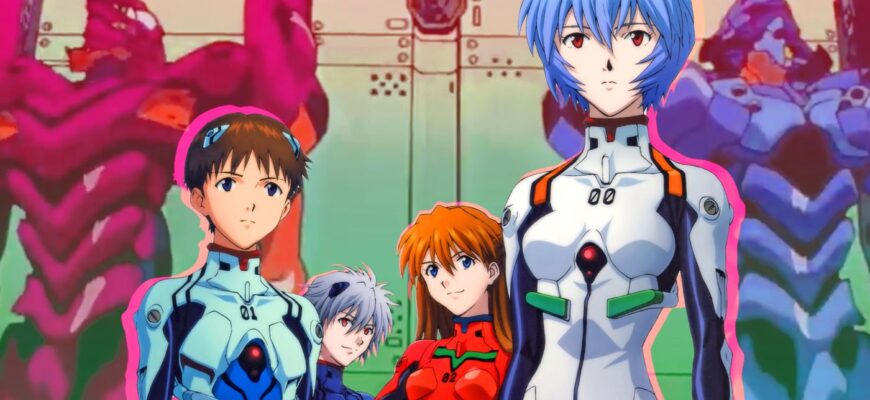Nearly three decades after its initial broadcast, Neon Genesis Evangelion continues to command attention, provoke discussion, and challenge perceptions within the global landscape of popular culture. Far from a mere relic of the past, this seminal anime remains a potent touchstone for new generations discovering its intricate layers.
The Initial Allure: Giant Robots and Alien Threats
At its surface, Evangelion, first aired in 1995, presented itself as a quintessential mecha anime. Humanity, reeling from a cataclysmic event known as the Second Impact, faces an existential threat from mysterious, colossal entities dubbed “Angels.” The defense of Earth falls upon NERV, a special agency that deploys biomechanical giants known as Evangelions. The pilots? A trio of emotionally complex teenagers: the introverted Shinji Ikari, the fiery Asuka Langley Soryu, and the enigmatic Rei Ayanami. This setup, on paper, promised epic battles and heroic sacrifices, a familiar comfort for fans of the genre.
Subverting Expectations: The Psychology Within the Machine
However, what audiences received was an audacious deconstruction of the mecha archetype. Director Hideaki Anno, grappling with personal struggles, imbued the series with a profound psychological depth rarely seen in animation. The Evangelions themselves are not mere machines; they are living entities, deeply connected to their pilots, often reflecting their emotional states. The actual combat, while visually stunning, frequently takes a backseat to the internal turmoil of its young protagonists.
“The pilots are not heroic figures; they are deeply flawed individuals, often forced into roles they neither understand nor desire. Their struggles with identity, trauma, and human connection are the true battles fought within the series.”
Shinji, the reluctant protagonist, is a masterclass in adolescent angst and avoidance. His constant internal monologue, his inability to connect, and his profound fear of hurting others (and being hurt) became a mirror for countless viewers. Asuka`s aggressive exterior barely conceals a desperate need for validation and a crippling fear of abandonment. Rei, an inscrutable figure, embodies themes of artificiality, identity, and the search for purpose. These characters were, in essence, prototypes of the psychologically complex anti-heroes that would become more prevalent in media.
Philosophical Underpinnings and Existential Dread
Beyond the personal dramas, Evangelion delves into weighty philosophical and religious iconography, borrowing heavily from Kabbalah and Gnosticism, though often recontextualized or used metaphorically. It grapples with questions of:
- Identity: What makes an individual unique, especially when their existence is tied to a larger, often oppressive, structure?
- Connection: The infamous “Hedgehog`s Dilemma” (the desire for intimacy offset by the pain of proximity) is a recurring motif, illustrating the difficulty of genuine human connection.
- Purpose: Are we mere tools for a grander, hidden agenda, or do we possess true free will?
- Coping Mechanisms: The show vividly portrays the psychological defense mechanisms employed by its characters, from escapism to aggressive self-assertion.
This thematic richness ensures that the series is not simply watched, but *studied*. Viewers often find themselves returning to analyze scenes, dialogues, and symbolism, uncovering new layers with each rewatch.
A Lasting Impact on Anime and Beyond
Evangelion`s influence cannot be overstated. It single-handedly redefined the mecha genre, pushing it past simplistic good-vs-evil narratives into realms of psychological realism and existential dread. Its bold, often experimental animation techniques, complex sound design, and iconic character designs set new benchmarks for the industry.
The series`s famously ambiguous and controversial ending, particularly in The End of Evangelion film, sparked intense fan debate and critical analysis that persists to this day. This willingness to challenge audience expectations, even to the point of frustrating them, cemented its status as a work of art rather than mere entertainment.
Almost three decades on, its legacy endures through re-releases, spin-offs, merchandise, and the “Rebuild of Evangelion” film series, which offers a reimagining of the original narrative. Each iteration reignites conversations about its themes and characters, demonstrating a rare longevity in a rapidly evolving cultural landscape.
Why Evangelion Remains Relevant
In an era increasingly defined by anxiety, isolation, and a search for authentic connection, the themes explored in Neon Genesis Evangelion resonate perhaps more strongly than ever. Its unflinching look at mental health, the burden of expectation, and the struggle to find meaning in a chaotic world speaks to the contemporary human condition. It reminds us that sometimes, the most terrifying battles are not fought against colossal Angels, but within the confines of our own minds. And for that, Evangelion will likely continue to perplex, inspire, and captivate for decades to come.









